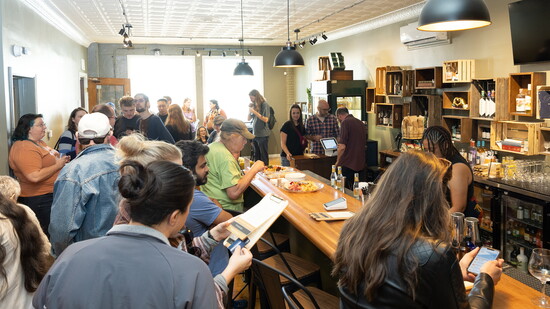Roughly two-and-a-half years ago, Sandy Blair put down her glass of wine for good. Like many who choose the sober-curious path, she quickly realized that letting go of alcohol is easier said than done—especially in a world of mommy wine culture, beer bros, and endless happy hours.
“I was trying to figure out how to live a sober life around everyone that was still drinking. So, I started to explore other options that were out there that weren't mind altering or body altering,” she says. After some research, she realized the non-alcoholic market was both limited and largely overlooked, with few people even aware it existed. Her gears turning, Blair began to explore NA possibilities, going beyond the yesteryear of O’Douls-only options.
Like Blair, Meg Hartman found herself in a similar situation when her husband, Bob, decided to quit drinking about six years ago. There weren’t many good options at the time for NA drinks, but they missed going out, drinking high-quality cocktails, and supporting local businesses and eateries.
Seeing a gap in the market, yet plenty of untapped demand, both entrepreneurs chose to launch their own ventures. In 2023, Blair created Mindful Sips. What began as an educational venture, hosting ladies’ nights to teach women how to make mocktails, soon grew into an online bottle shop. From there, it expanded into a mobile mocktail trailer, which she now brings to festivals and events like weddings throughout Rochester and the surrounding area.
Similarly, Hartman and her husband started exploring the space more and decided to host a non-alcoholic drink pop-up after taking classes on how to run an NA business. When they sold all 80 tickets, they knew they were onto something. In 2024, the husband and wife duo opened up Alt Bar in downtown Rochester, bringing a social scene and greater accessibility to those who still want to partake, sans the booze.
While it may seem like it’s still a niche space, it’s growing. One only needs to walk into a Wegmans to see the wider variety of NA options—from hard cider alternatives to NA craft beers and mixed drinks.
“More and more people are starting to focus on their well-being and realizing alcohol doesn’t always play a part in that journey,” says Hartman, adding that access to social media, where people are more vocal about sobriety and their mental health, has brought it increasingly to the forefront.
Blair’s experience echoes a larger movement. As she became more fitness-focused in her 30s, alcohol fit less naturally into her life. She and Hartman note that cannabis legalization has only accelerated the trend, giving some people an alternative as they rethink their relationship with alcohol.
“People are drinking less in restaurants, so they’re having to offer more NA options otherwise they’re losing income,” Hartman says, adding that being able to meet the demand “has put us in a good position to have an entirely non-alcoholic space.”
Although the NA space is growing more competitive, business is pretty good. Blair has been booked since April well into the fall, while Alt Bar has steady business, regulars, first dates, and dry January, which has become their highest sales month. This goes against traditional trends, with January usually being one of the slowest months in hospitality.
“The generational shift in alcohol awareness and disinterest is definitely growing, so I think the NA space will continue to expand as those generations continue to get older,” Blair says.
According to Bartenders Business, the NA industry is growing quickly as consumers embrace being more sober, with the United States and Brazil being big growth markets. The Boston Consulting Group reports that the global market for no-or-low alcoholic beers, wines, and spirits is now valued at $13 billion.
